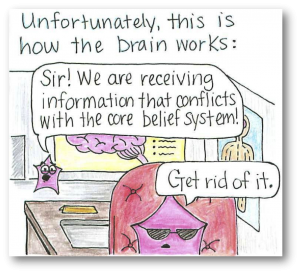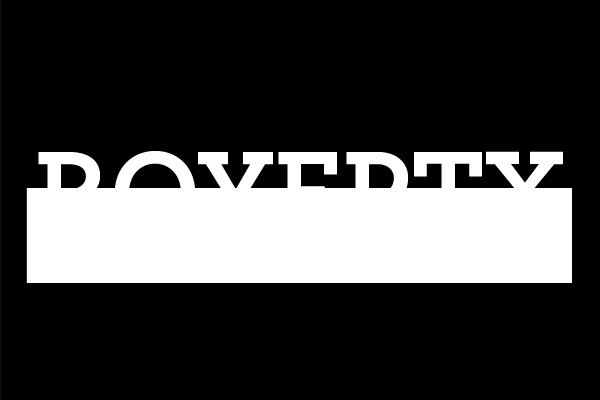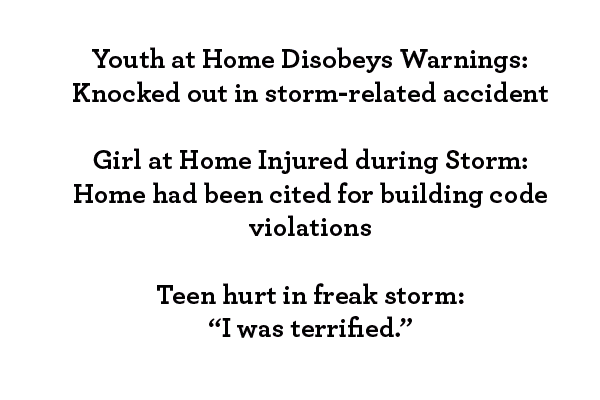Your brain doesn’t work the way it appears to.
Is this general statement a surprise? Probably not.
Behavioral economics and neuroscience is taking over the world. We’re told that understanding our mental foibles is the key to success, happiness and persuasion.
You may have imagined, as I have many times, figuring out the brain is the key to making the world a better place. But how do we string the cognitive research together to form a strategy that moves your mission or your policy agenda.
In a word: “framing.”
What is framing?
Take a look at the image below. What does the word say?
If you’re like 99% of people (perhaps especially for people in community or social services) your mind instantaneously told you the word was “poverty,” right?
But not so fast.
Now you can see the word isn’t “poverty” at all. If you had taken the time to really examine it, or wonder why I’d be asking such an obvious question you probably would have questioned your assumption. But the automatic part of your brain filled in the gaps and you saw poverty before you could think otherwise. The part of your brain that filled in word poverty is the same part of your brain that allows you to drive a car from the office to home without really paying attention to your route.
It’s incredibly efficient for our brains to do this. Thinking hard about things is an energy drain. At a certain level your brain doesn’t want to use extra resources on a blog post when it knows you have a big grant report to finish later.
The experts say we do this kind of automatic thinking AT LEAST half of our day. People you’re trying to talk to about your mission or your policy are no different – they are hearing what you say based on what they already know. By understanding the mental short cuts that our listeners are taking we have a better chance of actually communicating with them.
Patterns are the key
Our brains are amazing pattern recognition machines. We can instantly read complex environmental signals and draw conclusions from them.
And once we recognize a pattern, it gets encoded on our mind. Here’s a great example:
What was once incoherent noises became a clear statement. And, if you hear that noise again in a week, chances are you would be able to recognize the pattern.
We’re constantly drawing conclusions based on the little patterns we’ve recognized from the past and using them to shape our current reality. We’re not objective observers and we’re not blank slates.
We have a vast cocktail of past experience, genetic encoding, thinking, culture and communication that we use to understand what is happening to us right at this moment. Depending on what our particular cocktail is AND how information is presented, we can draw widely different conclusions when presented with information.
Reality depends on how you look at it
Dr. Liana Winett of Portland State University shares this great example of how we can frame one story several different ways.
Here are three headlines:
- Youth at Home Disobeys Warnings: Knocked out in storm-related accident
- Girl at Home Injured during Storm: Home had been cited for building code violations
- Teen hurt in freak storm: “I was terrified.”
Each headline refers to the same incident, but describe it in different ways. Take a moment to think, according to the headlines, who is to blame in each article?
It’s pretty obvious, right?
In the first article a disobedient youth is to blame. In the second article, perhaps the parents, landlord or local government are to blame for not making sure the home was fixed. In the third, nature or chance is to blame.
These headlines, by the way, tell a very familiar story I’m sure you’re aware of:
Advocates College
We already have certain notions in our heads. Those notions often appear automatically, are based on patterns derived from past experience and are impacted by how they have been presented to us. We have looked out at the world and drawn conclusions about how it should work. These are our frames.
It is in this morass of people’s preconceptions — not to mention the constant barrage of information online, on the radio, on TV, podcasts, books, magazines and thousands of media – that you must advocate and communicate.
How do we break through the clutter and frame issues so they truly resonate?
In the last several years, four cohorts of Oregon’s nonprofit, government and foundation leaders have asked themselves that very question.
And the answer is something we affectionately call: Advocates College.
Starting this fall, in five and a half day-long sessions stretched over four months, some of your smartest colleagues (and hopefully you) will attend the fifth Advocates College.
There will be a lot of interesting brain science, but most importantly there will be A LOT of practice. There will be a chance to learn on your feet and experiment in safe place so that you can pen an op-ed or speak in front of a legislative committee with fierce confidence.
I was in the second Advocates College cohort and it completely changed the trajectory of my career. It changed how I saw everything and it sparked a passion for the mind. I chose the red pill and I haven’t looked back since.
Social proof is an important part of communications, so I asked a couple of graduates to share thoughts about their Advocates College experience.
Jim Middaugh, Communications Director at Metro, said:
“Advocates College and Neighborhood Partnerships’ leadership significantly changed the way we think about communications. Now Metro staff and elected officials feel better prepared to communicate the essentials of what we do and the public is becoming more connected to our work. It’s a journey not a destination but Neighborhood Partnerships really paved the way for innovation and improvement.”
And Jeff Kleen, Public Policy Advocate for the Oregon Food Bank said:
“This in-depth values-based messaging training makes a profound impact across the state. NP’s talented staff, in coordination with nationally-recognized experts, teaches advocates the tools and skills needed to effectively communicate with policymakers, media, and the general public to advance their causes. I learned a tremendous amount in Advocates College and use the skills and knowledge I gained on a daily basis, incorporating them into written reports, presentations, and professional interactions.
Advocates College graduates work in a variety of fields – including housing, nutrition, health care, and human services – to help strengthen Oregon communities.”
Apply Now
The philosopher Richard Rorty once said: “. . . A talent for speaking differently, rather than for arguing well, is the chief instrument of cultural change.”
Advocates College offers a unique opportunity to learn how to speak differently in a way you never imagined.
You can click here to learn more about advocates college and apply. The deadline is fast approaching.
You can also call or email me with questions. Also, check out our Tumblr: A Talent For Speaking Differently.




